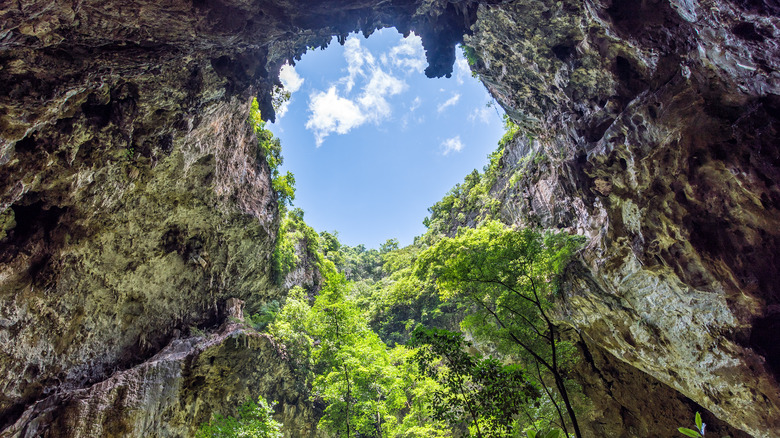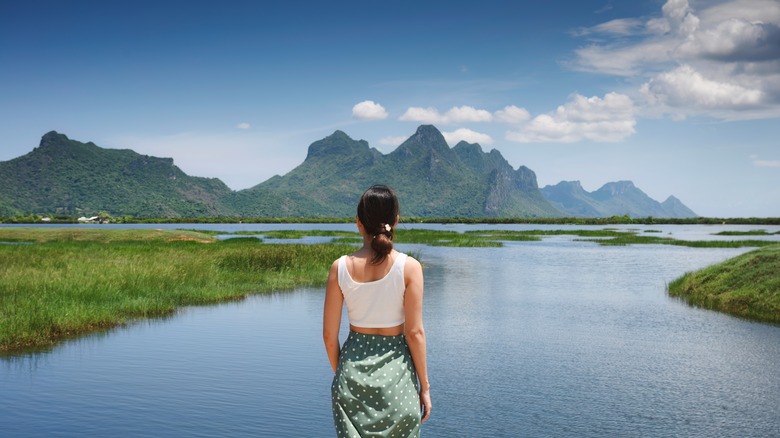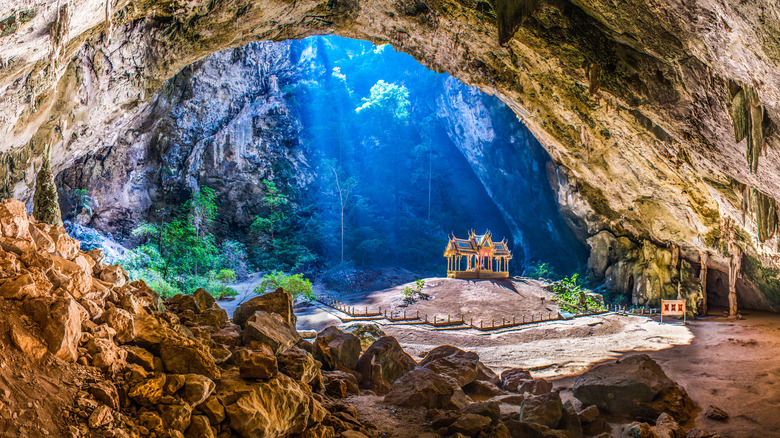Nestled in the heart of Southeast Asia, Thailand is a treasure trove of natural wonders, and among them, Phraya Nakhon Cave is one of a kind. An enchanting place that seems straight out of a fantasy or an “Indiana Jones” movie, and located in Khao Sam Roi Yot National Park (Prachuap Khiri Khan province), this cave is not only a geological marvel but a site steeped in history and cultural significance as well. It also happens to be one of the best places to visit in Thailand and one of the most photographed places in the entire country, and rightfully so.
The adventure to Phraya Nakhon Cave is as captivating as the destination itself. Generally, most travelers reach the national park from Hua Hin, a coastal village 45 minutes away — booking a tour from Hua Hin is recommended (like this one from Viator). The national park is about three hours and twenty minutes away from Bangkok. Admission to Khao Sam Roi Yot National Park costs 200 Thai baht per person.
The journey involves two parts. First, a scenic boat ride from Bang Pu village for 150 baht, or, alternatively, a 30-minute hike to reach Laem Sala beach. Once at the beach, the second leg of the expedition involves a steep 1,410-foot hike through the lush and rocky trails of the national park. This trek, although challenging, rewards travelers with breathtaking views and an immersive experience of Thailand’s natural beauty.
Phraya Nakhon Cave

Upon entering Phraya Nakhon Cave, you will be astounded by an otherworldly landscape. The most striking feature is the enormous cavern, open to the sky, where sunlight streams in, creating a mystical atmosphere. This natural skylight illuminates the cave’s main attraction — the Kuha Karuhas Pavilion. Built in 1890 for the visit of King Chulalongkorn (Rama V), the Kuha Karuhas Pavilion is a symbol of the cave’s historical importance. The pavilion, elegantly designed and well-preserved, stands as a monument within the cave’s natural splendor.
The contrast between the man-made structure and the rugged cave surroundings creates a surreal scene, especially when the sunlight perfectly aligns with the pavilion. To catch this phenomenon, it’s best to visit the cave in the morning between 10 and 11 a.m. The unique combination of natural and architectural beauty makes Phraya Nakhon Cave a haven for photographers. The way light plays within the cave, casting shadows and highlighting the pavilion’s features, offers endless opportunities for capturing beautiful images.
The serene pavilion is located within a second chamber of the cave. Worth exploring as well is the first chamber. It contains a dry waterfall and formations of ancient stalagmites and stalactites, offering a glimpse into the geology of Thailand’s limestone cave systems. It also has a collapsed “sunroof,” allowing for trees (some over 100 feet tall!) and plants to grow up the cave walls. Both chambers are home to a variety of wildlife, like the mainland serow and Dusky langur, and other various cave-dwelling creatures.
Explore further: Khao Sam Roi Yot National Park

Although Phraya Nakhon Cave is certainly a highlight, there is a lot you can do in Khao Sam Roi Yot National Park. The park’s name translates to “mountain with three hundred peaks,” highlighting its dramatic landscape of limestone mountains. It’s Thailand’s first marine national park and spans around 24,000 acres. The park’s diverse ecosystems include mangrove forests, beaches, and the largest freshwater marsh in Thailand. It’s a great destination for birdwatching, with around 355 bird species recorded.
The park offers various activities that allow you to explore and learn more about its environment. Kayaking in Thailand should be on your bucket list for sure, and you can do that around the park’s mangrove trail. Check out Khao Daeng Viewpoint for a 500-foot vantage panorama of the park and take a walk over the freshwater marsh at Bueng Bua Boardwalk. You can also visit Sai Cave and Kaeo Cave, both accessible by hike. After all the action, relax and swim at Laem Sala Beach or Sam Phraya Beach.
The ideal time to visit Khao Sam Roi Yot National Park and the Phraya Nakhon Cave is during the dry season, from November to February. This period offers warm weather and clearer skies, enhancing outdoor activities and wildlife encounters. During the winter season, set your birdwatching sights on the skies to watch as migratory birds travel through the area. The monsoon season from June to October may restrict access to some trails due to heavy rains.

